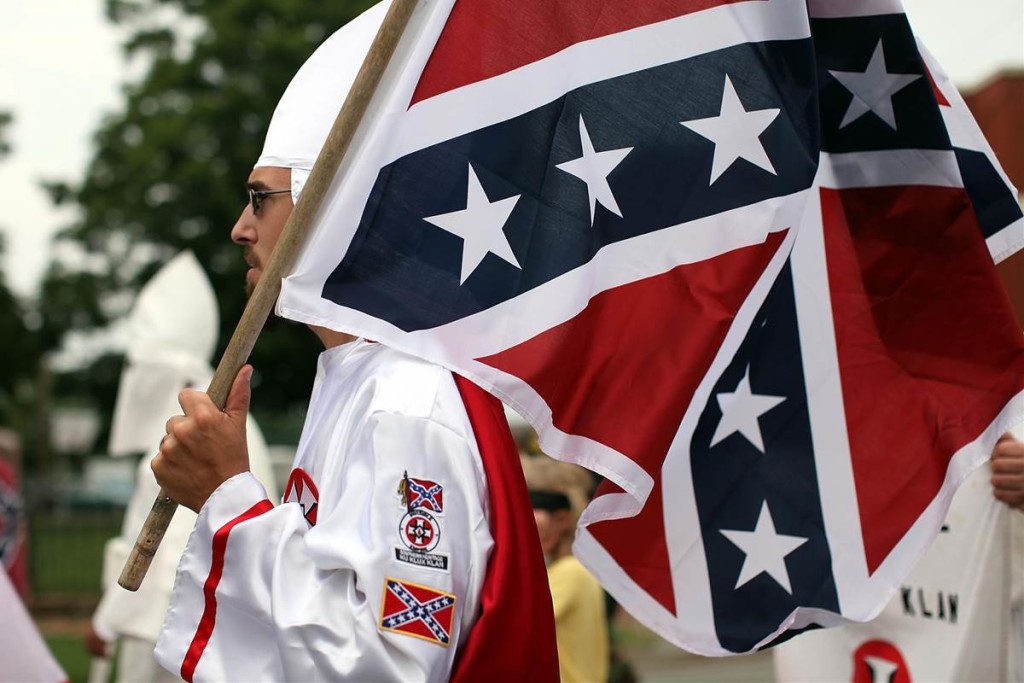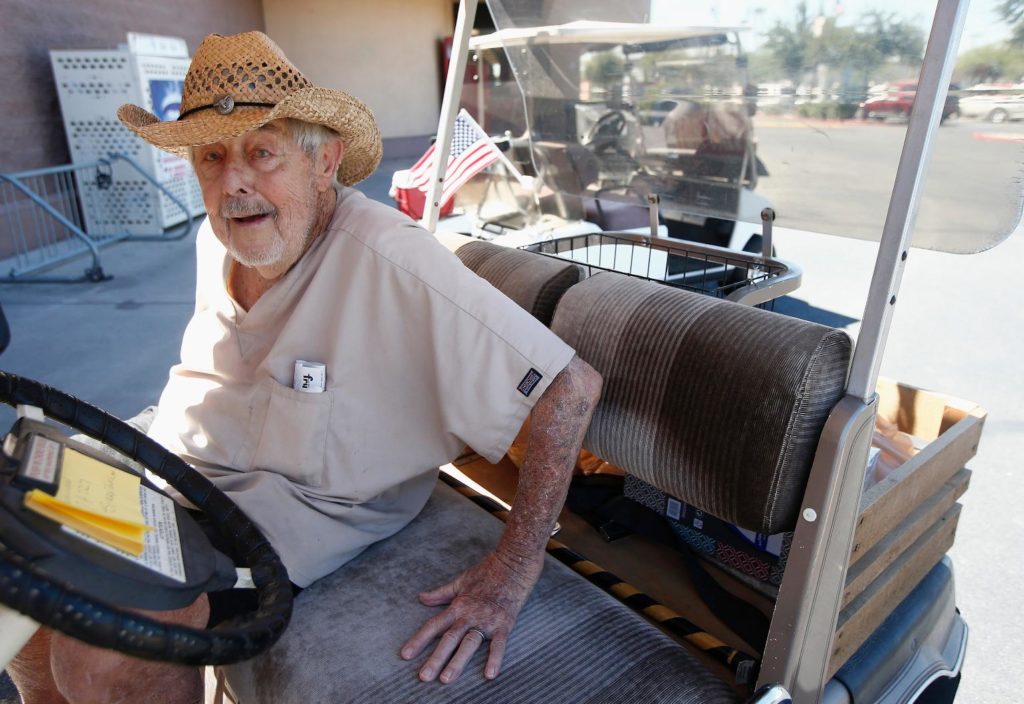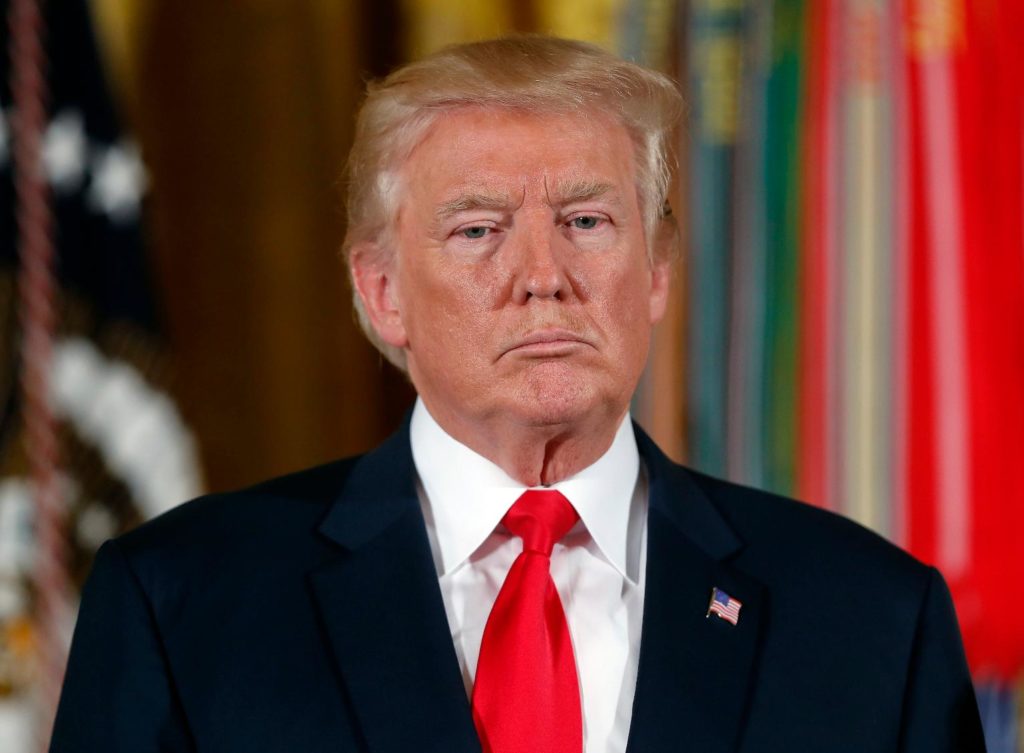Southern anger: Nazis, KKK ‘hijacking’ Confederate debate

White Southerners who equate Old South symbols with regional pride rather than hate are even more on the defensive since neo-Nazis, Ku Klux Klansmen and other extremists became the face of the fight over Confederate monuments. With more than two dozen relatives who fought for the Confederacy, Robert Castello literally wears his Southern pride. The visor, suspenders and ring he donned Thursday were all emblazoned with the familiar design of the rebel battle flag. But Castello, whose Dixie General Store sells Confederate-themed hats, shirts, stickers and signs in rural eastern Alabama, said he doesn’t have any use for overtly racist groups like the Klan. “When I was growing up it was like a badge of honor to be proud of your Southern heritage. It was taught and it was part of who you were,” said Castello, 58. “To see it denigrated down to the point of Nazis is disgusting.” A leading Southern heritage organization, the Sons of Confederate Veterans, had no official involvement in the bloody protests in Charlottesville, Virginia, and its leader condemned the white supremacists who rallied for preserving a statute of Confederate Gen. Robert E. Lee. “It’s painful to watch, for lack of better words,” said Thomas V. Strain Jr., the group’s commander. “It was our family that fought, and it was our families that died, and now we have these knuckleheads hijacking the flag for their own purposes.” Social media feeds dominated by Southern whites contain similar criticism of extremist organizations, which watchdog groups have said were out in force in Charlottesville in the largest white supremacist gathering in years. The driver of the car, James Alex Fields Jr., 20, has been described as an admirer of Adolf Hitler and Nazi Germany. Photographed with white nationalist demonstrators before the deadly crash, Fields is charged with murder and other offenses. The Confederate battle flag has long been used as a symbol by the Ku Klux Klan, which has displayed the banner during rallies for decades. But many white Southerners see the flag and rebel monuments as nothing more than part of a regional identity that includes Lynyrd Skynyrd music, college football, sweet tea and the Bible. The idea that any of those things have become caught up with Nazism is baffling to people like Castello. “I’ve always loved Southern heritage, even when I was in high school,” he said. “It was passed down that it was an honorable thing and I believe it was, although not all of it was good.” Even the children of Southern music icon Johnny Cash are distancing themselves from extremists after a neo-Nazi was shown wearing a shirt with an image of the late singer in Charlottesville. A Facebook post by the Cash family requested that his name “be kept far away from destructive and hateful ideology.” Jeff Schoep, who leads a white nationalist group that demonstrated in Charlottesville, said Confederate symbols and monuments have become a rallying cause for white extremists not because of any Southern identity but because they see their removal as an “assault on American freedoms.” To be sure, neither Castello nor Strain advocates the removal of Confederate monuments. Both see them as important historical touchstones that have an important place in modern life. “These statues were erected over 100 year ago to honor the history of the United States,” said Strain. “They’re just as important to the entire history of the U.S. as the monuments erected to our forefathers.” Similarly, President Donald Trump on Thursday blasted the movement to remove Confederate monuments, tweeting that the nation is seeing “the history and culture of our great country being ripped apart.” Castello supports Trump and sees the president as the unlikely New York real estate magnate who has become a defender of Southern symbols. Trump seems to get that not all Southerners are Nazis or Klansmen, Castello said, and others should, too. “To me all the talk about the Klan and the Nazis is a smoke screen for an attack on Southern heritage,” he said. “They want to link everyone who flies the (Confederate) flag with the Klan and Nazis, which I don’t want any part of.” Republished with permission of The Associated Press.
Donald Trump’s die-hard supporters show no signs of straying

They wash their hands of neo-Nazis and wag their fingers at leftists. They denounce a press corps they see as biased and controversies they view as manufactured. But in the frenzied blame game over the deadly violence at a rally of white supremacists, Donald Trump‘s loyal base is happy to absolve the president himself. Even as Trump’s zig-zag response to the weekend bloodshed in Charlottesville, Virginia, has brought criticism from some Republican lawmakers, many men and women who helped put him in office remain unmoved by the latest uproar. “He has done nothing to turn me away from him,” said Patricia Aleeyah Robinson, of Toledo, Ohio. Robinson is black and her support of Trump has put her at odds with many in her life, costing her friendships and straining family relationships. But the 63-year-old retired truck driver sees the controversy over Trump’s response to Charlottesville as being driven by those seeking to disrupt his agenda and push backers like her away. She said she knows he pays no deference to racists and feels he is the only president who has ever spoken directly to blacks. She admires his refusal to sugarcoat his beliefs. Three hundred miles south in a Charleston, West Virginia, shopping mall, Joyce Ash took a moment to ponder Trump after buying a dress Wednesday to wear to the funeral for her husband of 33 years, who died of pancreatic cancer. The 71-year-old woman summoned nothing but support for the political novice who led her to ditch her lifelong support of Democrats. She recalled sitting up all Election Night to watch Trump clinch the win, and said nothing since made her reconsider her vote. “Let the president do his job instead of trying to take him out every time you turn around,” Ash implored. She didn’t follow the back-and-forth over Trump’s statements on Charlottesville but saw no reason to question him: “I believe in Donald Trump, I really do. I believe that if they would just give this man a chance, the economy, everything will start going better.” Though images of Nazi flags and men in white hoods sickened many Americans, the president’s most ardent champions saw no reason any of that should change their feelings for Trump. “You know why it doesn’t bother me? Because he is everybody’s president whether you like him or don’t like him. Everything he does, he’s doing it for our country,” said Patsy Jarman, a 70-year-old retired factory worker in New Bern, North Carolina. “And if you don’t like being here, you need to leave.” Such enthusiasm may be unsurprising in some ways. Trump himself boasted last year he “could stand in the middle of Fifth Avenue and shoot somebody and I wouldn’t lose voters.” Polls showed his approval ratings dipping even before this flare-up, and now some commentators are proclaiming a historic low point and late-night comedians have turned serious. But many Trump voters interviewed Wednesday showed no sign of moving away from him. In Florida, 50-year-old Steven Damron of Spring Hill said the president handled the Charlottesville situation well, and he agreed with Trump that “both sides” were to blame. In Iowa, Branden Nong, 35, of Waukee said that while he wished the president was more careful with his tweets or in his criticism of fellow Republicans, his vote was driven by economic issues, and he has been happy with Trump’s performance. And in Pennsylvania, 46-year-old substitute teacher Julie Horrell of Mohrsville said: “I am sticking by the president. It’s early in his term yet. He needs to get the time to dig in his feet.” Julie Brown, a 42-year-old real estate agent in Gilbert, Arizona, accused the media of twisting Trump’s statements on Charlottesville and said local officials did a bad job preparing for the protests. But she remains fully behind a president she sees as exactly the unpolished, authentic leader that the U.S. needs right now, and thinks of how her 4-year-old son will someday learn of this time. “He’s going to be reading in a textbook one day about the good and the bad that this president is going to do,” she said, “but I hope and I believe it’s going to be more good.” Republished with permission of The Associated Press.
Donald Trump says racism is ‘evil,’ condemns KKK and neo-Nazis as ‘thugs’

Under relentless pressure, President Donald Trump on Monday named and condemned “repugnant” hate groups and declared that “racism is evil” in a far more forceful statement than he’d made earlier after deadly, race-fueled weekend clashes in Charlottesville, Virginia. Trump’s initial failure on Saturday to denounce the groups by name – instead he bemoaned violence on “many sides” – prompted criticism from fellow Republicans as well as Democrats. This time, the president described members of the KKK, neo-Nazis and white supremacists who take part in violence as “criminals and thugs” in a prepared statement he read at the White House. “Racism is evil,” he said, singling out the hate groups as “repugnant to everything that we hold dear as Americans.” “Those who spread violence in the name of bigotry strike at the very core of America,” he said. In his remarks he also called for unity. “We must love each other, show affection for each other and unite together in condemnation of hatred, bigotry and violence. We must rediscover the bonds of love and loyalty that bring us together as Americans,” he said. Trump also, for the first time, mentioned Heather Heyer by name, as he paid tribute to the woman killed when a car plowed into a group of anti-racist counter-protesters in Charlottesville. The president left after his statement without acknowledging reporters’ shouted questions. At an event on trade later in the day, he was asked why it took two days for him to offer an explicit denunciation of the hate groups. “They have been condemned,” Trump responded before offering a fresh criticism of some media as “fake news.” Trump noted that the Justice Department has opened a civil rights investigation into the car crash that killed Heyer. “To anyone who acted criminally in this weekend’s racist violence, you will be held fully accountable. Justice will be delivered,” he said. His attorney general, Jeff Sessions, said earlier Monday that the violence “does meet the definition of domestic terrorism in our statute.” Sessions told ABC’s “Good Morning America,” ”You can be sure we will charge and advance the investigation toward the most serious charges that can be brought, because this is an unequivocally unacceptable and evil attack that cannot be accepted in America.” Trump gave his statement after meeting with Sessions and FBI Director Christopher Wray. In the hours after the incident on Saturday, Trump addressed the violence in broad strokes, saying that he condemns “in the strongest possible terms this egregious display of hatred, bigotry and violence on many sides, on many sides.” That was met with swift bipartisan criticism. Virginia Gov. Terry McAuliffe, a Democrat, said he spoke to Trump in the hours after the clashes and twice told the president “we have to stop this hateful speech, this rhetoric.” He said he urged Trump “to come out stronger” against the actions of white supremacists. Republicans joined Democrats in criticizing the president for not specifically calling out white nationalists. Sen. Cory Gardner of Colorado said Sunday on NBC, “This isn’t a time for innuendo or to allow room to be read between the lines. This is a time to lay blame.” The White House scrambled to stem the tide of criticism, dispatching aides to the Sunday talk shows and sending out a statement that more forcefully denounced the hate groups. But the White House did not attach a name to the statement. Usually, a statement would be signed by the press secretary or another staffer; not putting a name to one eliminates an individual’s responsibility and often undercuts the significance. White nationalists had assembled in Charlottesville to vent their frustration against the city’s plans to take down a statue of Confederal Gen. Robert E. Lee. Counter-protesters massed in opposition. Alt-right leader Richard Spencer and former Ku Klux Klan leader David Duke attended the demonstrations. Duke told reporters that the white nationalists were working to “fulfill the promises of Donald Trump.” Trump’s initial comments drew praise from the neo-Nazi website Daily Stormer, which wrote: “Trump comments were good. He didn’t attack us. He just said the nation should come together. Nothing specific against us. … No condemnation at all.” The website had been promoting the Charlottesville demonstration as part of its “Summer of Hate” edition. Trump, as a presidential candidate, frequently came under scrutiny for being slow to offer his condemnation of white supremacists. His strongest denunciations of the movement have not come voluntarily, only when asked, and he occasionally has trafficked in retweets of racist social media posts during his campaign. His chief strategist, Steve Bannon, once declared that his former news site, Breitbart, was “the platform for the alt-right.” Early Monday, the CEO of the nation’s third largest pharmaceutical company said he was resigning from the President’s American Manufacturing Council, citing “a responsibility to take a stand against intolerance and extremism.” Trump lashed back almost immediately at Merck CEO Kenneth Frazier on Twitter, saying Frazier “will have more time to LOWER RIPOFF DRUG PRICES!” Republished with permission of The Associated Press.


